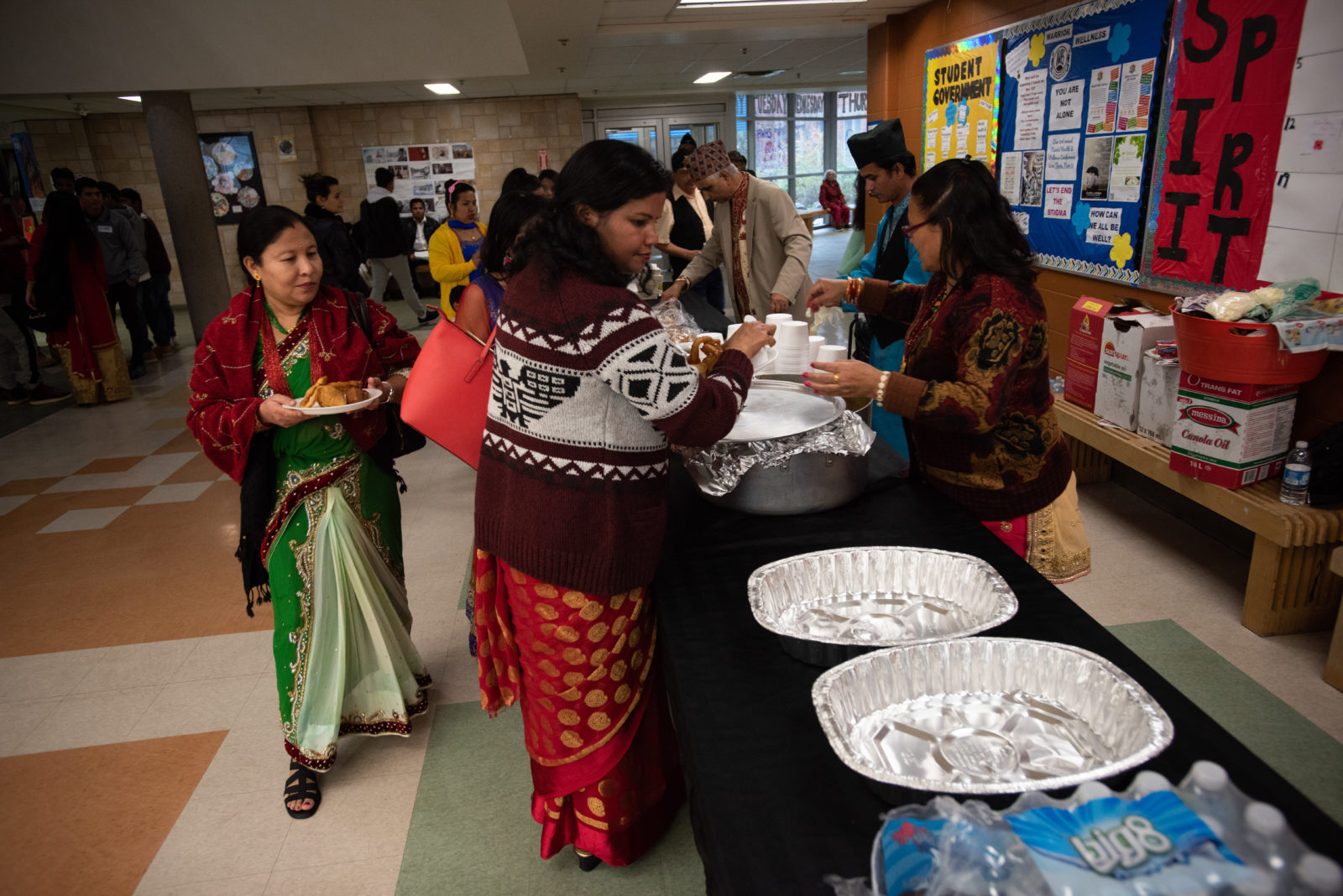
Pulling up roots: Bhutanese exodus from Halifax offers clues to why newcomers stay or go
Cover Photo: Performers from the Halifax Bhutanese community dance at the Diwali festival at Bella Rose Arts Centre. Sandor Fizli/PPF
By Kelly Toughill
There are two reasons that the massive, quiet exodus of Bhutanese families from Halifax should worry the policy-makers, politicians, academics and business leaders who believe immigration is essential to the future of Atlantic Canada.
First, most Bhutanese deliberately chose Halifax. They were not accidental residents who drifted here assuming that Nova Scotia was a way station to a better life elsewhere. Halifax was supposed to be the destination. This was supposed to be their better life.
Second, the Bhutanese weren’t lured away by the gravitational pull of a well-established community in a big city, as has been true of so many other newcomers who abandoned Atlantic Canada. The Bhutanese aren’t moving to Toronto, Vancouver or Montreal. Most have resettled in the rural villages and small cities of southwestern Ontario.
There is no consensus on exactly when the exodus began, or exactly how many Bhutanese have vanished, but every Bhutanese immigrant interviewed for this article agreed that their community is shrinking. Some say 20 percent are gone. Others say 45 percent have disappeared. All say the trend is accelerating.
The rise and fall of Halifax’s Bhutanese community may trouble those devoted to increasing the population of Atlantic Canada through immigration, but it also offers a chance to look at the factors that encourage a community to take root – and the factors that lead them away. The Bhutanese story touches on the key issues of immigrant retention: economic opportunity, education, the nature of welcoming communities – and a few more as well.
They are known as the Lhotsampas, Nepali-speaking residents of southern Bhutan who were driven from their country in 1992. More than 100,000 of them lived in seven refugee camps in in Eastern Nepal for almost two decades and were eventually resettled in eight different countries. The United States took almost 85,000 Lhotsampas. Canada agreed to take 6,500.
Subash Bhujel explains how he chose Canada.
“I went to the Internet market in the refugee camp with my friends to look up the eight countries. I wanted to see the history of them and what their benefits are. I didn’t know anything. It looked like Canada had many benefits and opportunities, so we chose Canada.”
He arrived in Halifax in 2013, with his wife and first daughter. His mother, father, sister and his sister’s two children followed in 2015.
Bhujel’s choice was a communal endeavor, not an individual decision, for the migration was intended to relocate not just his family, but a web of multi-generational relationships. He did not go to the market alone; he went with his friends. Bhujel’s father maintained his village ties all through his years in the refugee camps, and that was their goal coming to Canada – to stay connected.
I miss them a lot, but what can you do?
Exact numbers for the Bhutanese community are hard to pin down. It’s likely that some appear in records as Nepalese and others as Bhutanese, but it’s clear that Nova Scotia’s share of the influx was striking. When an immigrant group chooses Canada, Nova Scotia rarely competes with Ontario as a favoured location. But this time it did. About 500 Bhutanese landed in Nova Scotia as permanent residents between 2009 and the end of 2015, almost half as many as went to Ontario.
By 2016, Nepali was the fourth most common mother-tongue of Nova Scotia immigrants who had arrived in the previous five years. The 2016 census reported 350 Bhutanese and 235 Nepalis were living in the province.
Many Bhutanese were growing food in the city’s community garden [see related article]. There were news articles about the positive contributions that Bhutanese were making in Halifax, and the Nova Scotia Legislature issued a commendation to a Bhutanese youth group that raised money for earthquake victims in Nepal. The group – Druk Youth Atlantic Society – also organized the first Diwali ceremony for the Bhutanese community in Halifax. It still does.
Sanita Kuikel was one of about 150 people who gathered at the Bella Rose Arts Centre one recent rainy afternoon to celebrate Bhutanese Diwali. She wore a brilliant red dress and gold earrings and lined up with her sister-in-law for delicious samosa, ghaja, sel roti and matar paneer.
She didn’t shy away from talking about the exodus.
“Every day someone is leaving, or says they are thinking about leaving,” she said. “You never know who is next.”
She estimates that there were 500 Lhotsampas at the community’s height and that the number has dwindled to between 250 and 300. It is an estimate repeated by several others.

Januka Humagai is the daughter of an influential elder who was, until recently, a spokesperson for the community with local dignitaries and with the press. Her father moved to Ontario this year. Humagai is married and has no plans to leave, but she calls her family every day, sometimes Facetiming them during her lunch break.
“I miss them a lot. But what can you do.”
So what happened?
Rupesh Dhungana is by any measure a Bhutanese success story. He arrived at age 19 full of hope and ambition. He helped found the Druk Youth Atlantic Society and organize the first Diwali festivals. He graduated with a criminology degree from Saint Mary’s University and was hired by the Immigrant Services Association of Nova Scotia to help other newcomers find their way.
He explained the exodus while sitting on a bare mattress in a bare apartment under the glare of an overhead light. Everything except one small table and two aluminum chairs has been sold or packed away. Rupesh and his wife, Puj Dangal, are preparing to leave Nova Scotia, probably forever. He’s headed to RCMP training in Regina. His wife, Puj Dangal, will stay with his family in Listowel, Ontario until he is done. Leaving was never part of his dream.
“I wanted to stay in Nova Scotia. But it’s my family, and my career.”
At first, his story sounds a very familiar refrain. It’s about jobs. He outlines the basic economics:
Many of his friends want to be personal care workers. In Nova Scotia, that would mean $8,000 tuition and a starting salary of $16 an hour. In Ontario, his friends will pay only $4,500 college tuition, earn a starting salary of at least $20 an hour and pay much lower income taxes. So they are going to work in nursing homes and assisted living centres in Ontario, not Nova Scotia.
No one is going to drive 20 hours to Nova Scotia to see us.
That should be particularly disappointing to those who track demographic data. Atlantic Canada has a higher proportion of seniors than any other part of the country, and is facing a labour crisis in the health care industry. New Brunswick alone expects to hire more than 12,000 nurses, aides, support workers and social workers over the next 10 years.
Khadga Bandari is a good friend of Dhungana. Bandari’s family was one of the first to move to Nova Scotia, and Bandari was one of the first to move away. He left shortly after finishing a degree in chemical engineering at Dalhousie University.
He says that the biggest employer in the Halifax Bhutanese community is a local cleaning company. In Ontario, he says, his relatives are working in factories and stores – and making more money.
Both Dhungana and Bandari say the other factor is the network effect.
There was no large Bhutanese community in Canada when the refugees first began to arrive. Would they develop a critical mass of friends and family in Halifax? Was there hope of a Nova Scotia node for the Lhotsampas diaspora?
But 80 percent of the Bhutanese who left Nepal went to the United States. Nova Scotia is not a border province, so it was hard for Halifax Bhutanese to see their friends and relatives living in the U.S.
Changes to Canada’s citizenship law also meant that it was almost impossible for Bhutanese to get the paperwork needed to cross the border, so they had to rely on their U.S. relatives to come to Canada instead.
“No one is going to drive 20 hours to come see us in Nova Scotia,” said Bandari. “That won’t happen.”
Living in Ontario, they are visited by relatives from Ohio, Michigan and Illinois.
Most Bhutanese arrived stateless, with no passport. When Bandari’s family arrived in 2009, the requirement to qualify for citizenship and a passport was simply to live in Canada for three years. But the federal government changed the rules and required that anyone under age 65 be proficient in English or French to qualify for citizenship.
“Many of our elders can’t even read and write their own language,” said Bandari. “They are not going to pass a language test in English or French.”
Then the passport fees were hiked to $630, which discouraged many newcomers from taking the final step to become Canadians.
They could have made us feel welcome.
So a node of Bhutanese began to grow in Southwestern Ontario, fueled in part by those who left Halifax. Dhungana says that most of his parents’ generation were farmers in Bhutan. They don’t want to live in cities, so they chose rural southwestern Ontario, where houses are still affordable, they can see their friends in the U.S. and the horizon is not cluttered with towers.
Better paying jobs, family networks. These are the constant pulls for newcomers who drift away from Atlantic Canada.
Ather Akbari is an economics professor at Saint Mary’s University who specializes in immigration. Retention factors are the same with all newcomers – not just refugees, he says. Jobs and family are the two biggest factors, but they vary by cultural background. Family ties and access to ethnic goods are more important for Asian immigrants than for Europeans.
“After a certain critical mass is established, then you see rising retention,” he said. “But not until then.”
At first, the story seems pre-determined, a depressing tale that would suggest really no one could have done anything to keep the Bhutanese community in Halifax. After all, you can’t move the Nova Scotia border closer to the United States. And Ontario does have more jobs.
And then Rupesh is asked, “Could officials, could Halifax society, have done anything to make the Bhutanese community stay?”
His head snaps up and his voice surges with emotion.
“Yes. They could have made us feel welcome.”
Dhungana says he begged for more English tutoring in high school and for information about scholarships but didn’t get either. He was lost and miserable when he got to Saint Mary’s University, and only survived because of a dedicated mentor arranged by the Immigrant Services Association of Nova Scotia.
“Our youth were not offered much scholarship. We were not recognized for our talents and our skills, only for our low level of English.”
Dhungana says that only a handful of his Bhutanese peers graduated from high school, and that only five of them finished university: himself, his brother and three friends. They all carry heavy student debt. Four of those five university graduates have moved away.

The tipping point seems to have come in 2016, when an influential priest packed up for Ontario.
“When someone dies in our community, or someone is born, you have to have a priest,” says Bandari. “The rituals can go for 18 days. They are not optional. This is something that is very personal and absolutely mandatory. In Ontario, even if there is not a priest right there, you can get a priest from another place, or to come from the United States.”
There are still two Hindu Bhutanese priests in Nova Scotia, but many are worried that they too may go. Staying in Nova Scotia without a local priest, Bandari says, is not an option.
Dhungana agrees on the timing.
“It started at the end of 2016,” he says. “By the end of 2017, everyone had a plan. We do everything jointly in our community. People who were thinking not to move are getting nervous.”
Dhungana says he only felt valued in Nova Scotia when he was finally able to communicate well in English, and that was a culture shock he never really got over. For the Lhotsampas, he adds, you do not need to share a language to share a friendship. One of their bedrock values is to make people feel welcome.
His comments are vividly illustrated at the Diwali Festival, where a stranger who knows no one in the room is invited to join the line for the communal feast. The after-meal show is conducted in Nepali, but one performer breaks into English briefly to shout, “Our job is to make everyone happy!”
The small crowd roars its approval.
Mohammed Haji Souliman and his family appear to be the only guests at the Diwali festival who are not Bhutanese or Nepali. Souliman is a settlement worker in a local middle school where students speak 15 different languages. He has many Bhutanese friends. He says the Bhutanese are leaving Nova Scotia for jobs in Ontario, but when asked about Dhungana’s allegation that they don’t feel welcome in Nova Scotia, he agrees.
“They don’t find good jobs here. They live a marginalized life and they feel not that supported here. We need to make them feel more included.”
Halifax Mayor Mike Savage balks at the notion that the Bhutanese might not feel welcome. Savage may be Canada’s most immigrant-friendly mayor. When he was first elected, he tried to allow residents who were not yet citizens to vote. He hosts a huge party for international students every year, attends newcomer events regularly and has launched several city initiatives designed to make those from away feel at home in his city.
“We want people to come from all over the country. I don’t think anywhere else in the world has been as welcoming of immigrants as we have.”. For example, he says, Halifax has offered free bus passes, gym memberships and museum admission to refugees since 2016.
“The folks who come with money, that’s wonderful to have, but we also want people to come just with a desire to build a better life for themselves and their families so I hope that everybody can find a home here in Halifax.”
I want to pass a message to my community that we can dream.
Souliman says the Bhutanese also lack outgoing leaders who will lobby for their interests and make connections for the community.
That’s what Rupesh Dhungana wants to do.
His goal is to become the first Nepali-speaking officer in the RCMP.
“As a child, I witnessed so many conflicts and criminal acts and saw police coming and trying to help the public. That was very inspiring. I wanted to do that since I was a child,” Dhungana says. “I love doing community work, but we never aim for high. We just want to settle. I want to pass a message to my community that we can dream.”
“Forty to 45 percent have left but the energy of the community has gone down 60 percent,” he says. “Those who left were very active, creative, talented and involved. Those who are staying are seniors and they are not educated.”
That seems true at the Diwali Festival, where almost half of the men and women are painted with a tika – the stripe applied to the forehead of respected elders in the Bhutanese community.
Sanita Kuikel’s daughter Angel is one of few children running through crowd.
Kuikel is one of the many Bhutanese who work for GDI, a major cleaning company in Halifax. Her English is perfect, so language should not be a barrier to her economic success.
Will she stay?
For now.
Will she be here in two years?
She looks at her sister-in-law. They both shrug.
“We don’t have any plans to move.”
What does her mother want for Angel?
“A better life.”
And what does “a better life” mean?
“More.”
“More what?” she is asked.
“More education. More opportunity.”
She pauses.
“More everything.”
Changes to Atlantic Immigration Pilot praised, but more are needed
Atlantic Immigration Pilot by the numbers: PR admissions lag job offers and work permits
Putting down roots: How community gardens help immigrant retention
This article is part of PPF’s three-year Immigration and Atlantic Revitalization project. Get our newsletter to keep up on the latest research.
Kelly Toughill is a consulting researcher with PPF, specializing in immigration policy. She is an award-winning journalist and Associate Professor of Journalism at the University of King’s College in Halifax, Nova Scotia. Prior to joining King’s, she was Deputy Executive Editor and former Atlantic Canada Bureau Chief for the Toronto Star. Professor Toughill is also the founder of Polestar Immigration Research, a media and consulting company that provides quality news, analysis and information about Canadian immigration to a range of stakeholders and institutions.





